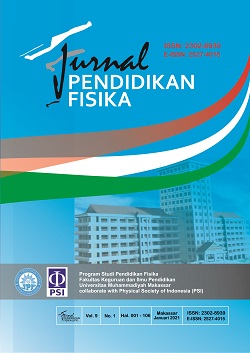Application of Ludo Board Game in Increasing the Activeness of the Physics Study Group of Mts DDI Seppange Students
DOI:
https://doi.org/10.26618/jpf.v9i1.4074Kata Kunci:
activity, ludo board game, study groupAbstrak
This study aims to describe the activeness of the members of the physics science study group by implementing the Ludo Board Game and seeing the students' responses to the application of the Ludo Board Game in increasing the activity of the members of the physics science learning group. To achieve this goal, descriptive research has been carried out using the Ludo Board Game game. The subjects of this study were students of class VIII MTS DDI Seppange in the 2019/2020 school year, which may be 24 people. The data research method used was observation (observation), questionnaires, interview techniques and documentation. Furthermore, the analysis technique is carried out by means of proportional descriptive data analysis. The results showed that the increase in the activity of students' study groups after the implementation of the Ludo Board Game (LBG). Meanwhile, the students' responses to the application of Ludo Board Game in increasing the activeness of members of the physics science study group were very feasible, namely for the quality of the content with an eligibility level of 81.25% and a 94.53% usage level.
Referensi
Departemen Pendidikan Nasional. (2015), Kamus Besar Bahasa Indonesia Pusat Bahasa Edisi Keempat. Jakarta: PT. Gramedia Pustaka Utama
Marhadi. (2019). Permainan ludo sebagai media pembelajaran pendidikan jasmani, olahraga dan kesehatan pada siswa sekolah dasar Tadulako. Journal Sport Sciences and Physical Educatio, 7( 2), 19-31
http://jurnal.untad.ac.id/jurnal/index.php/PJKR/article/view/15029
Napsawati. 2019. Hubungan kinerja dan kepribadian guru dengan motivasi belajar fisika peserta didik SMA Negeri Se-Kabupaten Bantaeng, Jurnal Karst, 2(2), 64-70
https://ejournals.umma.ac.id/index.php/karts/article/view/424
Octavia, S. (2020) Model-model pembelajaran. Yogyakarta: Deepublish
Oktiani, I. (2017). Kreativitas guru dalam memotivasi belajar peserta didik. Jurnal Kependidikan, 5(2), 216-232
Oemar, H. (2013). Proses belajar mengajar. Jakarta : PT.Bumi Aksara
Pane, A., & Dasopang, M. D. (2017). Belajar dan pembelajaran. Jurnal Kajian Ilmu-ilmu Keislaman, 03(2), 333-352
https://www.researchgate.net/publication/332198329_BELAJAR_DAN_PEMBELAJARAN
Parnawi, A. (2019). Psikologi belajar. Yogyakarta: Deepublish
Putro, K. Z. (2016). Mengembangkan kreativitas anak melalui bermain. Jurnal Aplikasi Ilmu-ilmu Agama, 16(1), 19-27
https://www.researchgate.net/publication/338861340_Mengembangkan_Kreativitas_Anak_Melalui_Bermain
Sardiman, A. M. (2016). Interaksi dan motifasi belajar mengajar. Jakarta: Kharisma Putra Utama Offset
Trianto. (2014). Model pembelajaran terpadu: konsep, strategi, dan implementasinya dalam kurikulum tingkat satuan pendidikan (KTSP). Jakarta: Bumi Aksara
Wibowo, N. (2016). Upaya peningkatan keaktifan siswa melalui pembelajaran berdasarkan gaya belajar di SMK Negeri 1 Saptosari. Jurnal Electronics, Informatics, and Vocational Education (ELINVO), 1(2), 128-139
https://journal.uny.ac.id/index.php/elinvo/article/viewFile/10621/8996
Unduhan
Diterbitkan
Terbitan
Bagian
Lisensi
Copyright:
Authors who publish with this journal agree to the following terms:
1. Authors retain copyright and grant the journal right of first publication with the work simultaneously licensed under a Creative Commons Attribution-ShareAlike 4.0 International License that allows others to share the work with an acknowledgement of the work's authorship and initial publication in this journal.
2. Authors are able to enter into separate, additional contractual arrangements for the non-exclusive distribution of the journal's published version of the work (e.g., post it to an institutional repository or publish it in a book), with an acknowledgement of its initial publication in this journal.
3. Authors are permitted and encouraged to post their work online (e.g., in institutional repositories or on their website) prior to and during the submission process, as it can lead to productive exchanges, as well as earlier and greater citation of published work.
Licence:
Authors are free to:
1. Share: Copy and redistribute the material in any medium or format
2. Adapt: Remix, transform, and build upon the material for any purpose, even commercially.
The licensor cannot revoke these freedoms as long as the authors follow the license terms, which include the following:
1. Attribution: You must give appropriate credit, provide a link to the license, and indicate if changes were made. You may do so in any reasonable manner, but not in any way that suggests the licensor endorses you or your use.
2. ShareAlike: If you remix, transform, or build upon the material, you must distribute your contributions under the same license as the original.
3. No additional restrictions: You may not apply legal terms or technological measures that legally restrict others from doing anything the license permits.
Jurnal Pendidikan Fisika is licensed under a Creative Commons Attribution-ShareAlike 4.0 International License.

